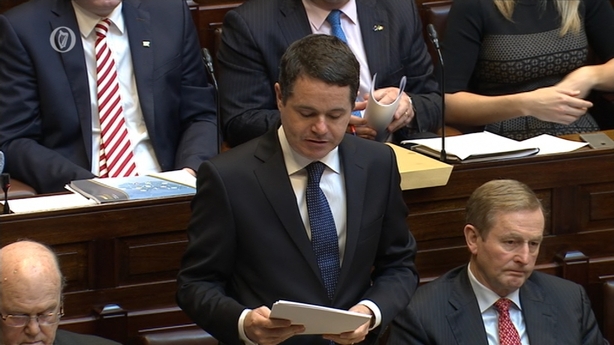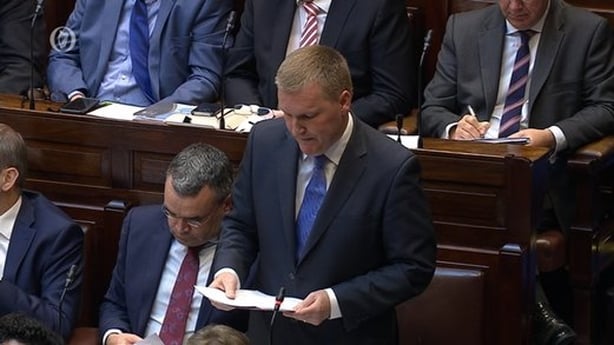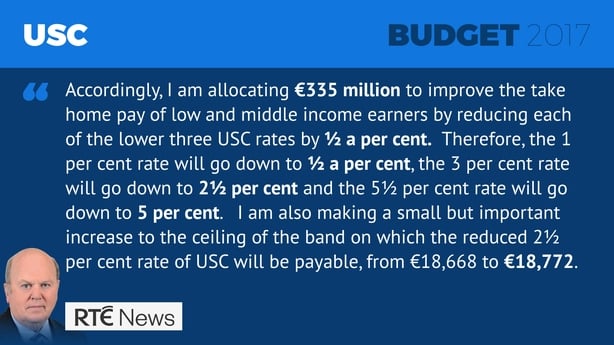Whatever about any of the individual measures in Budget 2017 the overall package provides an answer to a conundrum of recent months – what exactly does “new politics” mean?
New politics can now be summed up in three words – The Centre Holds.
Here's Minister Paschal Donohoe at the conclusion of his Budget speech:
"Those of us in the middle ground of politics have a duty to show that co-operation and consensus can work ... to show that things won’t just fall apart and the centre can hold."

Minutes later Fianna Fáil finance spokesman Michael McGrath echoed that sentiment saying the centre ground was under attack and "the centre has to hold".

So, protecting and shoring up that centre ground, was the overriding political imperative of Budget 2017 and to the extent that there was a little for everyone across the country and sufficient for Fine Gael, their Independent Alliance ministerial colleagues and Fianna Fáil to ensure it gets over the line, the centre will hold.
The glue to keeping the centre intact is a suite of measures in Budget 2017 that allows each of its three component parts to sign up.
So for Fine Gael the Budget ticks the box of being fiscally prudent and it helps deliver a little, and it is a little, on the party’s pledge to gradually abolish the Universal Social Charge.

The Independent Alliance and Fianna Fáil can argue that overall they secured a significant shift in how the resources were divvied up and spent.
The bulk of the available €1.3bn was allocated in directed increases aimed at improving public services.
More gardaí, more teachers, more nurses and a record €14.6bn allocation for the Department of Health.
This all sounds great but in reality many of the new gardaí, teachers and nurses will just enable the system to stand still.
As for the €14.6bn for health, the real test of this will be when the Health Service Executive publishes it service plan for next year. That will set out, in detail, how the available resources will be spent across the various headings.
Aside from some initiatives – such as the additional funds for the National Treatment Purchase Fund to help tackle waiting lists – it is unlikely there will be any radical increases in services.
And even with €14.6bn who would bet against the prospect of health budgets running into difficulty next year?
There is unlikely to be any easing of the political pressures on health, housing or the general cost of living.
To that extent Fine Gael, the independents and Fianna Fáil would be naive to believe the centre will not remain under attack from parties and groups on the Left who will argue for a different and more populist approach.
That said, Budget 2017 consolidates the minority government and allows it plan ahead for next year and potentially beyond.
The Fianna Fáil 'Confidence and Supply' deal is for three budgets. So one down and two to go.
The first was always going to be the easy one – everyone had a vested interest in ensuring the centre hold thus far.
The most immediate financial threat to this Government would appear to be a dire fall-out from Brexit.
But the political threat comes from within.
Yesterday, it emerged that Taoiseach Enda Kenny told constituency colleagues he intends to contest the next general election. And last night he told RTÉ's Nine News that he hoped to be sitting in the studio as Taoiseach for Budget 2018. He could hardly say otherwise.
Still if a view develops within Fine Gael that Mr Kenny does not intend moving on any time soon – and next summer being the most likely break point – it has the potential to trigger trouble.
Should Fianna Fáil sense they might be faced with a new Taoiseach heading a government that is re-positioning itself with the voters we might then see a real test of just how solid the centre really is.
But for now - the centre holds and for Budget 2017 it's "job done."







